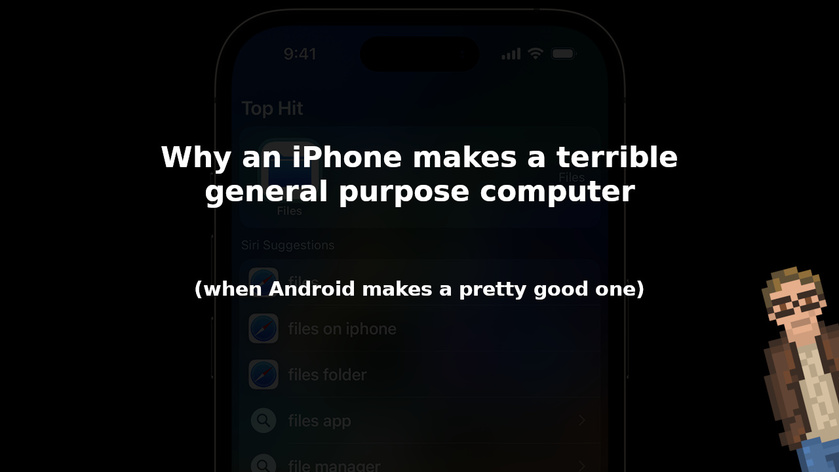When I sat down to evaluate the viability of using an Android phone as a laptop replacement... I was, surprisingly (to me), a bit impressed.
While the experience is certainly not perfect, Android possesses enough key features (and retains enough "computer-like" qualities), that an Android phone can step in and take the role of a more traditional, general purpose computer (with an operating system like Linux, Windows, or macOS).
Which got me thinking... Can I do the same with an iPhone?
After spending a considerable amount of time struggling to get an iPhone to perform some key taks, the answer was crystal clear:
An iPhone can not take the place of a standard computer.
Simply not possible. iOS, as an operating system, is purposefully (and artificially) hobbled specifically to restrict what can be accomplished by an end user. It is a rare example of an operating system designed specifically to make a computer less powerful.
There are two key problems that illustrate this.
Problem #1: Forbidden software
The first issue is, I believe, the most obvious (and widely discussed). Apple, for whatever reason, specifically worked to make sure specific types of software cannot be installed and used on any iOS device.
To accomplish this task, Apple did two critical things:
- Apple forbade users from installing software outside of the official Apple App Store.
- Apple then blocked segments of software from being available on the App Store.
The net result is an absolutely huge number of application types that simply cannot be found or used on your typical iPhone:
- Emulators & virtual machines
- Powerful software development tools (including interpreters and compilers)
- File managers with any significant features
Those three, while only a partial list, are the three that -- in my opinion -- create the broadest negative impact. Imagine Windows, Linux, or even macOS without any of those three categories of applications available.
Preposterous, right?
It would cause the system to become almost unusable as a computer.
Yet that is the approach that Apple has taken with iOS.
Problem #2: Managing files is a nightmare
While the issue with Apple forbidding software on iOS is a critical one -- and, by itself, is enough to make iOS a mere shell of what it could be -- there is another key problem with the way iOS functions that... even if you can work around the software problem... makes iOS nearly unusable for... almost everyone.
File management.
Because of the way file access works with iOS applications, the seemingly simple act of working with a single file using multiple applications becomes a maddeningly complex process.
Want to produce a podcast?
Let's say you record your podcast audio within one application. In order to edit or compress that audio... you'll need to export it from the first application.
And then, depending on the specifics of each application you are using, you'll likely need an application to act as an intermediary -- to move it in and out of the global file storage.
More than likely, you'll need to do this multiple times -- as it is extremely unlikely that you'll be able to do all of your podcast recording, editing, compressing, and publishing all from within a single application.
You cannot simply save a file to a central location -- an SD card, a home directory, etc. -- and open / save that file from any application you wish.
iOS does not allow that.
The more complex your project, the more maddening and time consuming this gets. Dealing with complex graphics projects or videos (with several clips that need to be adjusted and rendered in different applications)? You can easily end up spending more time fighting with iOS's ridiculous file management restrictions than actually working on your project.
It's enough to drive a man to drink.
Android doesn't have theses problems
Let me be clear: I am not a fan of Android.
The number of complaints I have about Android is greater than all the grains of sand yadda yadda yadda. And that's not even including the privacy and security with Google's OS.
But, if you want to use Android as a general computing device? It works. With annoyances, to be sure, but it works.
Not only does iOS not work as a general computing device but, even if it did... even if Apple fixed the whole "forbidden software" issue... I would still want to light my iPhone on fire if I were forced to use it as such based purely on the problems with file management.
For a company that used to pride themselves on building some of the best user interfaces in all of computing... it's pretty gosh darned disappointing.
And, the truly terrible part is this: It doesn't need to be this way. Apple made iOS this way on purpose.
Because, I assume, they hate us all.















